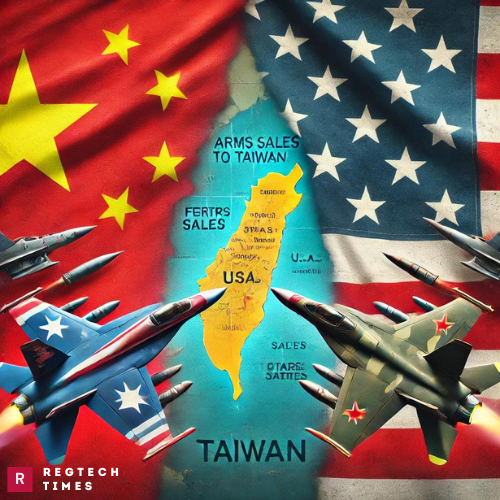China sanctions on U.S. defense firms have recently intensified tensions between Washington and Beijing. The Chinese government has imposed these sanctions in response to the U.S. State Department’s approval of a $228 million arms deal to Taiwan. This development marks a significant escalation in the ongoing dispute over Taiwan, a self-governing island that Beijing claims as part of its territory.
The Core of the Dispute: Taiwan’s Status
At the heart of this issue is Taiwan’s status. Taiwan operates as a separate entity with its own democratic government and military, despite Beijing’s insistence that it is an integral part of China. The People’s Republic of China (PRC) adheres to the “One-China Principle,” which asserts that Taiwan is part of its territory.
The United States, while officially recognizing Beijing as the sole government of China, continues to support Taiwan under the Taiwan Relations Act (TRA). This act commits the U.S. to providing Taiwan with the means to defend itself, although it does not guarantee military intervention. The TRA is a key component of U.S. policy regarding Taiwan and highlights Washington’s dedication to preserving peace and stability in the region.
China Sanctions and Rationale
China sanctions on U.S. defense firms have been imposed in response to their involvement in arms sales to Taiwan. On Wednesday, China announced these sanctions against nine U.S. defense companies, including Sierra Nevada Corporation and Cubic Corporation. The sanctions involve freezing any assets these firms hold in China and prohibiting transactions with Chinese entities. Lin Jian, a spokesperson for the Chinese Ministry of Foreign Affairs, stated that U.S. arms sales to Taiwan violated the one-China principle, infringed upon China’s sovereignty, and harmed China-U.S. relations.
These China sanctions are significant as they reflect China’s growing military and political pressure on Taiwan. Beijing has been actively sending warplanes into Taiwan’s air defense identification zone and conducting military exercises near the Taiwan Strait. The sanctions act as a strong warning to Washington to cease its support for Taiwan, which China considers a direct challenge to its sovereignty.
U.S. Arms Sales and Strategic Interests
The imposition of China sanctions highlights the strategic significance of arms sales to Taiwan for the United States. The U.S. views Taiwan as a key ally in the Indo-Pacific region, and maintaining Taiwan’s defense capabilities is crucial for regional stability. The recent arms sale of $228 million is aimed at helping Taiwan maintain its military readiness amid growing threats from China. The U.S. justifies these sales under the Taiwan Relations Act, viewing them as essential to preserving peace in the Taiwan Strait.
Australia’s Strategic Presence in the South China Sea: Strengthening Ties with the Philippines
Despite adhering to the One-China Policy, which acknowledges Beijing as the legitimate government of China, the U.S. continues to provide Taiwan with defensive weapons. This support is a response to China’s increasing military assertiveness and is intended to counterbalance Beijing’s growing influence in the region.
The Broader Implications of China Sanctions
The imposition of China sanctions on U.S. defense firms highlights the broader geopolitical struggle between Washington and Beijing. Beyond Taiwan, U.S.-China relations have been strained over various issues, including trade disputes, technological competition, and China’s actions in the South China Sea. Both nations have accused each other of escalating tensions, with Taiwan remaining a particularly contentious issue.
During a recent meeting between U.S. National Security Advisor Jake Sullivan and Chinese military official Zhang Youxia, China reiterated that Taiwan’s status is a “red line” in U.S.-China relations. Zhang demanded that the U.S. halt its “military collusion” with Taiwan, emphasizing that Taiwan’s status cannot be compromised.
China sanctions on U.S. defense firms represent a significant escalation in the ongoing tensions between the two superpowers over Taiwan. The sanctions, combined with Beijing’s demands for Washington to end its support for Taiwan, highlight the deepening rift between the U.S. and China. As both sides remain firm on their positions, the situation in the Taiwan Strait continues to be a critical flashpoint in global politics, with the potential for further escalation if diplomatic solutions are not found.


